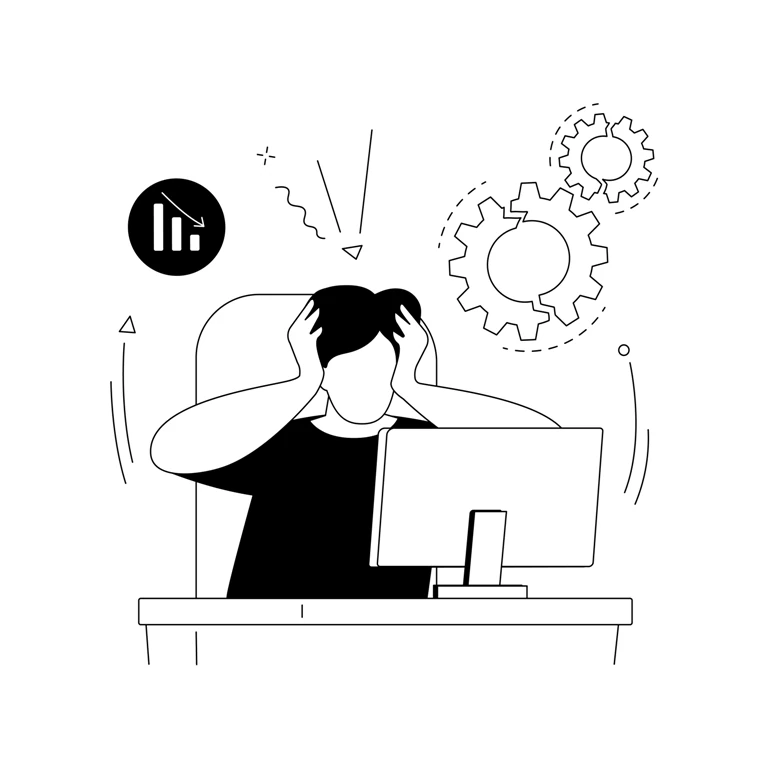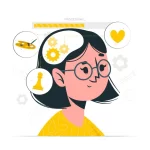What is Frustration?
Frustration is an emotional response that arises when individuals encounter obstacles or challenges that prevent them from achieving their goals. It is characterized by feelings of disappointment, annoyance, and a sense of being thwarted or hindered in one’s efforts. Frustration can result from various sources, such as external circumstances, personal limitations, or unmet expectations.
When people experience frustration, it can manifest in different ways, including irritability, agitation, stress, or even aggression. The intensity of frustration can vary depending on the perceived significance of the goal, the perceived difficulty of overcoming the obstacle, and individual differences in coping mechanisms.
It’s a natural and common human emotion, and managing frustration is an important aspect of emotional intelligence. Developing effective coping strategies, problem-solving skills, and resilience can help individuals navigate challenges and reduce the impact of frustration on their well-being.

How frustration is harmful for our lives?
Frustration, if not managed appropriately, can have several harmful effects on individuals’ lives. Some of these negative consequences include:
Physical Health Issues:
Prolonged or chronic frustration can contribute to various physical health problems, such as elevated stress levels, increased blood pressure, headaches, digestive issues, and compromised immune function. The physiological response to frustration, if persistent, can take a toll on the body.
Mental Health Concerns:
Unresolved frustration can contribute to mental health issues such as anxiety and depression. It may also exacerbate existing mental health conditions, leading to a negative cycle of emotional distress.
Impaired Decision-Making:
Frustration can cloud judgment and impair decision-making abilities. When individuals are overwhelmed by frustration, they may struggle to think rationally and make effective choices, potentially leading to poor decisions with lasting consequences.
Strained Relationships:
Frustration can spill over into personal relationships, leading to conflicts and strained interactions with family, friends, or colleagues. People under the influence of frustration may express their emotions in ways that are hurtful or damaging to relationships.
Reduced Productivity:
Chronic frustration can hinder productivity and hinder the ability to focus on tasks. It may lead to procrastination or a lack of motivation, impacting one’s ability to meet goals and responsibilities.
Impact on Well-Being:
Frustration can contribute to a diminished overall sense of well-being. The negative emotions associated with frustration can erode one’s happiness and satisfaction with life, affecting both mental and emotional well-being.
Adverse Impact on Goals:
If not effectively managed, frustration may lead individuals to abandon or give up on their goals and aspirations. The perceived difficulty of overcoming obstacles can discourage persistence and resilience in the face of challenges.
To mitigate the harmful effects of frustration, it’s crucial for individuals to develop healthy coping mechanisms, resilience, and problem-solving skills. Seeking support from friends, family, or mental health professionals can also be beneficial in managing and overcoming frustration.
How can we avoid from frustration?
While it may be challenging to completely avoid frustration, there are strategies that can help individuals manage and reduce its impact. Here are some tips to cope with frustration:
Adjust Expectations:
Sometimes frustration arises from unrealistic expectations. Reevaluate your expectations and set more realistic and achievable goals.
Focus on What You Can Control:
Identify aspects of the situation that you can control and those that you cannot. Concentrate your efforts and energy on the factors you can influence, and accept the things you cannot change.
Develop Problem-Solving Skills:
Instead of dwelling on the frustration, work on finding solutions to the underlying issues. Break down the problem into smaller, more manageable parts and develop a step-by-step plan.
Practice Patience:
Understand that not everything will happen immediately. Cultivate patience and recognize that some things take time. Taking a long-term perspective can help alleviate frustration.
Take Breaks:
If you’re feeling overwhelmed, take a break to clear your mind. Physical activity, deep breathing, or a short walk can be effective in reducing stress and frustration.
Learn to Manage Stress:
Incorporate stress management techniques into your routine, such as meditation, mindfulness, yoga, or deep breathing exercises. These practices can help calm the mind and reduce frustration.
Seek Support:
Talk to friends, family, or colleagues about your frustrations. Sometimes, simply expressing your feelings can provide relief, and others may offer valuable perspectives or advice.
Develop Resilience:
Cultivate resilience by viewing challenges as opportunities for growth. Focus on learning from setbacks and developing a positive mindset.
Practice Mindfulness:
Stay present in the moment and avoid dwelling on past frustrations or worrying about future challenges. Mindfulness techniques can help you stay grounded and focused.
Take Care of Yourself:
Ensure you are getting enough sleep, eating well, and engaging in activities you enjoy. Physical and mental well-being play a significant role in how well you cope with frustration.
Remember that frustration is a natural emotion, and it’s okay to experience it. The key is to develop healthy coping mechanisms and a resilient mindset to navigate challenges effectively. If frustration becomes overwhelming or persistent, seeking professional help from a counselor or therapist can also be beneficial.
Treatment for frustration
While frustration itself is a normal emotion, persistent or intense frustration that significantly impairs daily functioning may warrant attention. Treatment for frustration often involves a combination of self-help strategies and, in some cases, professional assistance. Here are some approaches:
Self-Help Strategies:
- Mindfulness and Relaxation Techniques: Practices such as mindfulness meditation, deep breathing exercises, or progressive muscle relaxation can help manage stress and frustration.
- Physical Exercise: Regular physical activity has been shown to reduce stress and improve mood. It can be an effective way to release pent-up frustration and tension.
- Hobbies and Leisure Activities: Engaging in activities you enjoy can provide a sense of accomplishment and satisfaction, helping to counteract frustration.
Cognitive-Behavioral Therapy (CBT):
CBT is a therapeutic approach that helps individuals identify and change negative thought patterns and behaviors. It can be effective in addressing the cognitive aspects of frustration and developing healthier coping strategies.
Stress Management Training:
Learning stress management techniques, time management skills, and effective problem-solving strategies can contribute to better frustration management.
Support Groups:
Joining a support group or talking to others who may be experiencing similar challenges can provide a sense of understanding and community. Sharing experiences and coping strategies can be beneficial.
Healthy Lifestyle Choices:
Prioritize a balanced and healthy lifestyle, including sufficient sleep, a nutritious diet, and avoiding excessive consumption of substances like alcohol and caffeine, which can contribute to heightened stress.
Professional Counseling or Therapy:
If frustration is significantly impacting your life, seeking the assistance of a mental health professional, such as a counselor or therapist, can provide a safe space to explore underlying issues and develop coping strategies.
Medication:
In some cases, if frustration is accompanied by other mental health conditions such as anxiety or depression, medication may be prescribed. It is essential to consult with a healthcare professional to determine the most appropriate course of action.
For individuals who find frustration often manifests as anger, participating in anger management programs can provide specific tools and techniques for anger control and emotional regulation.
It’s important to note that the effectiveness of these approaches may vary from person to person, and the best course of action depends on individual circumstances. If frustration is causing significant distress or impairment in daily life, seeking professional guidance is advisable. A mental health professional can conduct a thorough assessment and tailor a treatment plan to address specific needs.










